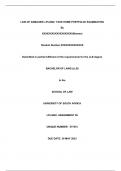Exam (elaborations)
LPL4802/ LAW OF DAMAGES EXAM ANSWERS, 2023
- Institution
- University Of South Africa (Unisa)
- Book
- Law of Damages
THIS DOCUMENT CONTAINS A FULLY ANSWERED AND REFERENCED TAKE HOME EXAM ON THE MODULE : LAW OF DAMAGES/ LPL4802
[Show more]



